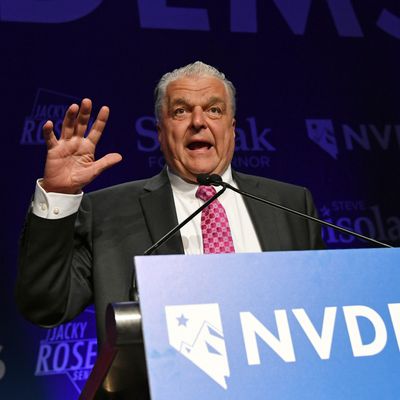
The Electoral College is an indefensibly stupid institution. Contrary to depressingly widespread belief, America’s contemporary approach to electing presidents does not uphold the Framers’ intentions, or encourage presidential candidates to campaign in rural areas, or give small states a way of checking the power of big ones, or achieve any of the other stupid, high-minded objectives that the Electoral College’s defenders stupidly champion.
But the system does (for now) make it easier for the Republican Party to win presidential elections without appealing to a majority of the national electorate. And it awards disproportionate influence over the Executive branch to the small fraction of states that happen to have a relatively similar number of Democratic and Republican residents.
But conservatives do not feel comfortable defending the institution in nakedly partisan terms. So instead, they have tricked themselves into believing that there are extremely coherent reasons why the Electoral College should exist, no matter its partisan implications. And they will continue to believe their own sophistry until the day the Democratic Party loses the popular vote but wins the presidency by eking out 51 percent of Texas’s ballots.
Similarly, Nevada’s Democratic governor Steve Sisolak isn’t willing to say that he likes the Electoral College because the Silver State is just purple enough to force presidential aspirants to heed its idiosyncratic concerns. Thus, when Sisolak vetoed a bill that would have committed Nevada to the National Popular Vote Compact (NPVC) Wednesday, he did so in the name of a breathtakingly stupid (but high-minded sounding) principle.
For those unfamiliar with the NPVC, its goal is to get a group of states that collectively boast a majority of Electoral College votes to pledge their delegates to the winner of the national popular vote, thereby nullifying the Electoral College for all practical purposes. This is the most politically viable means of ensuring the popular election of presidents, since the Constitution mandates the Electoral College, but gives states discretion over how to allocate their delegates. At present, 15 states with a collective total of 189 EC votes have joined the compact. Nevada’s Democrat-controlled state legislature voted to make the Silver State number 16.
But on Thursday, Sisolak announced that his conscience simply wouldn’t allow him to sign the measure.
“Once effective, the National Popular Vote Interstate Compact could diminish the role of smaller states like Nevada in national electoral contests and force Nevada’s electors to side with whoever wins the nationwide popular vote, rather than the candidate Nevadans choose,” Sisolak said in a statement. “As Nevada’s governor, I am obligated to make such decisions according to my own conscience. In cases like this, where Nevada’s interests could diverge from the interests of large states, I will always stand up for Nevada.”
The National Popular Vote Compact would not “diminish the role of smaller states” or promote the “interests of large states.” In fact, in the highly plausible event that Texas becomes light blue, the NPVC could actually prevent the large states of Texas, California, and New York from installing a president over the objections of a large majority of “small state” voters. Meanwhile, under the Electoral College system, voters in America’s eight smallest states by population — Wyoming, Vermont, Alaska, North Dakota, South Dakota, Delaware, Rhode Island, and Montana — receive approximately zero attention from presidential candidates.
Thus, even if ensuring that tiny states that are already overrepresented in the federal legislature are also disproportionately influential in presidential elections were somehow a noble cause, preserving the Electoral College wouldn’t actually advance it. In fact, in 2012, then-federal Judge Richard Posner defended the Electoral College on the grounds that it diminishes the role of smaller states, which deserves to be diminished:
The Electoral College restores some of the weight in the political balance that large states (by population) lose by virtue of the mal-apportionment of the Senate decreed in the Constitution. This may seem paradoxical, given that electoral votes are weighted in favor of less populous states … But winner-take-all makes a slight increase in the popular vote have a much bigger electoral-vote payoff in a large state than in a small one. The popular vote was very close in Florida; nevertheless Obama, who won that vote, got 29 electoral votes. A victory by the same margin in Wyoming would net the winner only 3 electoral votes. So, other things being equal, a large state gets more attention from presidential candidates in a campaign than a small states does.
Anyhow, it’s not clear how consequential Sisolak’s veto will ultimately be. There’s a decent chance that, by the time NPVC states have 264 Electoral votes, Nevada will be solidly blue enough to throw its six delegates onto the pile without forfeiting any clout. But it’s still rather dispiriting to hear a Democratic governor echo one of the dumbest arguments in contemporary American politics. Just say you want to make sure presidential candidates are forced to pretend that the Yucca Mountain Nuclear Waste Repository is a top-tier national issue every four years until the end of the time.






























